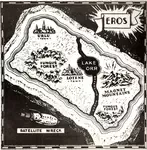invasions from mercury
Although our closest interplanetary neighbours, the Martians and Venusians, have naturally taken the lead in the business of invading Earth, the more distant, smaller, innermost planet is by no means guiltless of anti-Terran aggression. Mercury has evinced some surprisingly imperialist tendencies in the literature of the Old Solar System.
Motives of the Mercurians
Stid: "Surprising" is the word! Why don't they invade Venus instead? It's nearer, and the climate must be more suitable for a Mercurian.
Harlei: Ah, come off it; why do they have to be rational?

Stid: Sorry, it's just that I prefer reasons, so let me invent one, will you? Here goes: the swampy OSS Venus is too humid for the customarily parched denizens of the innermost planet. How about that?
Harlei: Well done, Stid, you've cured yourself of your own state of surprise. And as for the extra distance between Mercury and Earth, think about it and you'll realize that invaders do tend to come from distant, out-of-the-way fringes, as we know from Earth history: the Vikings, the Manchus... And their remoteness gives them a sense of entitlement. Like: "We've had to rough it in the outlands; now it's the turn of those softies to suffer: they can provide loot for us, or be our slaves."
earth enslaved
Zendexor: Indeed on one occasion the people of Earth were actually enslaved, for a while, by the "Mercutians".
Stid: Hence the title of the long 1932 novella, Slaves of Mercury. I take it that's your starting point. Good idea to get that one over with first.
Zendexor: Now, now, don't be nasty. It's wrong to dismiss the tale so early in the discussion. Wrong to deny other readers the chance I had to appreciate the opening.
Hilary Grendon, pioneering spaceman, returns to the good Earth:

Hilary's eyes blurred with unaccustomed mistiness as he drank in the warm sunlight, the soft green of the grass and the gracious lines of the slender birches... This was the only heaven; beyond that [the] far-flung immensity of planetary orbs was hell!
The date is "April in the Spring of 2348", which you might think is rather late in history for the start of the space age. Which in itself gives an interesting slant on how things seemed in 1932. (And remember that Olaf Stapledon, writing in the 1930s, put spaceflight millions of years in the future.) Another quaint touch is that Grendon is the inventor as well as the pilot of his space-vessel. Those were the days when we could think of astronautics as open to individual tinkerers, private inventors... imagine today's Elon Musk or Bert Rutan tinkering a rocket into shape and then going up in it himself...
Harlei: And the pilot is specially glad to get home, after the stress he's gone through, the weird things he's seen on the other worlds of the Solar System. I really like the list we get, of three of the bizarreries...
far-out beings
Zendexor: Yes, in this first chapter we get what I call a "scenic list". I've noticed elsewhere - Clark Ashton Smith and H P Lovecraft come to mind - that sometimes an OSS author will toss off a picturesque list of strange creatures and places, which are not mentioned again in the story, but which establish a context of cosmic variety and adventurous possibility. And the items in such lists are, I find, always poignantly interesting.
Home again, the old familiar Earth! He could scarcely believe it! Perhaps it was only a dream, and he'd wake up among the unhuman glittering cylinders of Saturn, shuddering and crawling with the iciness of their fixed regard...
Stid: I think you put that one on your Saturn page.
Zendexor: It's a particularly good snippet so I thought I'd repeat the words, rather than just do a reference link. Two more items - again I'll put them in red -
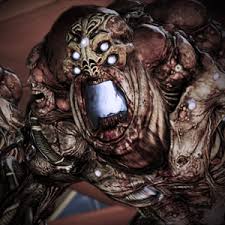
How long was it since they had started out on the first flight that man had taken into outer space, he and those staunch comrades? Five years? God! Had it been so long? Yet here he was, back on Earth again, the kindly, blessed Earth their eyes had clung to when they were fighting desperately for their lives against the protoplasmic things that inhabited Ganymede...
Hilary brushed a tear away as he thought of those brave, loyal friends. Martin had been engulfed in an unholy maw on Ganymede... Dorn was a frozen idol to the spiral beings of Pluto...
He, Hilary Grendon, was the sole survivor of that tremendous Odyssey!
mediocre mercutians
Stid: All right, that's enough introductory fun. Now suppose you come clean about this story, Zendexor. If you won't, I will. It's all very well to chat a bit about the colourful opening details, but in all honesty you should inform the readers, lest they waste their time on it, that Slaves of Mercury is badly written; the dialogue wooden or corny and not even adapted to the stereotypical, crudely-drawn characters; the plot full of coincidences -
In short, we might read this tale only as part of an academic exercise, an investigation into low-grade pulp literature. We might enjoy the exercise but only in a detective spirit, as one might enjoy some medieval writer for the sake of what his work tells us about one little corner of the history of literature. That's all.
Zendexor: Hm... as a matter of fact there are quite a few academic types around. I am one, as you doubtless have noticed. And yes, I read stuff like Slaves of Mercury for the background, not for the plot. I winnow it, teasing out the assumptions which are of interest; in this case, for example, the public conveyors and the vita-crystal homes of twenty-fourth-century Earth.
But as for the story - I can't argue with you, for you're quite right, it is extremely disappointing.
The Mercurians - "Mercutians", rather - are just rather tall, warty, humanoid slobs, oppressors without any redeeming features whatsoever. And we learn next to nothing about Mercury itself; the information we are given is embedded in only one interesting but very short snippet in Chapter V where Grendon is being taught the history of the invasion and its aftermath:
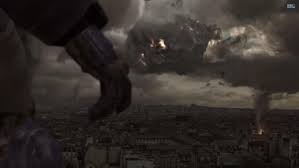
...the Mercutians set up their government. The Earth was turned into a colony. The leader of the invaders, the son of the Mercutian emperor, became Viceroy, with absolute powers. Sooner or later, it was their intention to transport the entire Mercutian race to the Earth, and make it their permanent home. Mercury was not an ideal place to live on; in the restricted area round the poles where life was possible, terrific storms alternated with furnace droughts, to which the hottest part of the Sahara was an Arctic paradise...
Harlei: Interesting, yeah, that we have polar ecosystems instead of the usual Twilight Belt on this version of OSS Mercury. Maybe because the planet has next to no axial tilt. In fact you could say that the real Mercury, the NSS Mercury, must have, not a Twilight Belt, but Twilight Poles...
Stid: Seems that this story we're supposed to be talking about keeps tempting us to talk about other things. And the reason our attention wanders is that if it doesn't, it has to come back to the corniness of the tale itself.
When they were trussed so tightly that neither could move, the Viceroy smiled mockingly. "We shall meet again, Earth dogs," he said, and was gone.
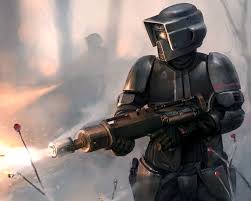
Don't know about you, but I think villains ought to be interesting. Shachner's Mercutians must be the most boring villains in OSS history. And the tale appeared in 1932, the same year that the vastly superior writer Edgar Rice Burroughs brought out his Pirates of Venus. The comparison... enough said, eh?
Zendexor: I agree absolutely, and yet there's something mysterious here. You mention Burroughs as superior, but when I consider his Kalkars, the villains in The Moon Men, I have to ask myself: are they and Shachner's Mercutians not equally one-dimensional?
Harlei: Hold it, Zendexor! The Moon Men is a great read.
Stid: Because it's much better written. Not soaked with corny melodrama. And because although the oppressors are caricatures, the book grips us by its portrayal of the everyday life of the oppressed, whereas Slaves of Mercury just gives us havoc and destruction.
nemesis of the invaders
Zendexor: All right, I think we've just about done that story to death now. But there's one point I want to make before we move on. You know how I like to find a connective thread between stories, by identifying tropes, underlying themes and traditions in the OSS. Here's one: the role of Earth's climate in defeating Mercurian invasions. Roughly speaking, our climate is to the Mercurians what terrestrial microbes are to Wells' invading Martians - that's to say, it's their nemesis.
I don't mean to suggest that events occur the same way in each story. The plots of Tetrahedra of Space and Slaves of Mercury are very different. Slaves hinges on a fight for control of a weather machine which has been set up to "Mercuriform" Earth. Tetrahedra tells of an invasion that never gets that far; it is nipped in the bud. But the thematic link is there.
better but still verbose
Stid: Another, less fortunate link is that both tales are vastly over-written.
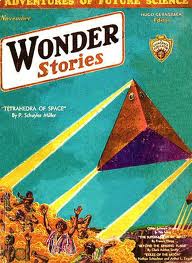
"I cannot tell you of the feeling that came to me," the weary, dried-out voice of the Professor droned despairingly on. "Here was a power absolutely at odds to all the great, painfully evolved civilization of mankind, a power that could and would crush us as a fly, if we came into conflict with the motives of the tetrahedral race! Here were beings endowed by nature with powers beyond our science - alien to our ideas of evolution, well-nigh to our imagination and reason. I felt the latent doom of mankind and of the very life-forms of all Earth, squatting here in our little, blasted valley with an ominous, cruel indifference that struck chill fear into my heart! And I knew that if Man must die, I would die too - die fighting for my race and my civilization! I think we all felt it, knew it in our hearts, and swore our oath of undying feud upon the violated rock of our valley home!"
Harlei: But you're not going to complain about this story as much as you did about the last one, are you, Stid? At least the tetrahedra are proper aliens. Really alien aliens.
Stid: True. And there's no "We shall meet again, Earth dogs" about them. We're one step up, now, from mediocre-level pulp fiction... though I feel I'm being generous in saying this, about a tale in which eight successive paragraphs end with an exclamation mark.
tetrahedral verbosity
Zendexor: Actually, the bit you've just mentioned is where, to my mind, the story starts getting interesting. Having given us the totally un-human tetrahedra, the author then has his narrator suggest that in some mysterious way he is deducing their emotions. If you can stomach the turgid prose, the effect can be quite eerie.
Then came their speech - of all things the most mind-wracking! I felt it deep within my brain, before I sensed it externally, a dull, heavy rhythm of insistent throbbing, beating at my temples and throwing up a dull red haze before my staring eyes!
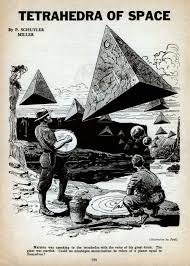
And then I knew it was no fancy - that the great things of the blasted valley were indeed speaking, chanting, in low, vibrant monotone that beat physically upon me in long, slow waves of the air! You have heard those deepest notes of a great organ, when the windows tremble, even the walls, the building itself vibrate in resonance, beat and beat and beat to its rhythm until you feel it throbbing against your skull, pulsing in your mind in a vast, relentless sea of thundrous sound!
Such was the speech of the tetrahedra, only deeper still beneath the threshold of sound - so deep that each tiny nerve of the skin sensed its monotonous pressure and shouted it to a reeling brain - so deep that it seemed like a great surf of more-than-sound thundering dismally against desolate, rocky shores!
For it was without inflection - only the dull, dead beat and beat and beat, mounting throb on throb in my pulsing brain, and bringing madness in its wake! I think now that it was a sort of chant, the concerted cry of all the scores of tetrahedra, dinning savagely, angrily at their giant leader in a dismal plaint of discontent and unease! I think they were restless, aware of unfulfilled promises and purposes, anxious to make sure of their mission, or to be gone. I think that the seed of tetrahedral mutiny was sown among them, and that as angry convicts will drum at their prison bars and scream in monotone, even so these things of another world, another life-stuff, drummed their grievances at their mighty leader!
Remarkably, the climax of Tetrahedra of Space gives us a scene in which communication, of a sort, is achieved between a man and the invaders. This final 8 or 9 pages is dramatically readable compared with the rest.
But my advice is, don't read it out of context - it only works if you have ploughed through what goes before. I know, because I tried it both ways. Years or rather decades ago, I skipped and skidded through the turgid bits and couldn't appreciate any of the story.
the hourless tapede
Finally we need to branch out from intelligent, material monsters to a different kind of invader... one for whom other categories don't seem to apply.
What can we make of the "hourless tapede", which infiltrates from Mercury to Earth in the final chapters of Valeddom?
Stid: It's not really an intelligence, more a kind of idiot malevolence.
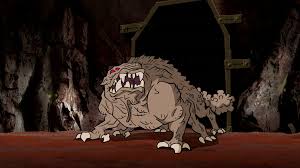
Harlei: I think of it being a bit like the "crawling chaos" Azathoth in H P Lovecraft...
Zendexor: I hadn't thought of that, but yes, you could be right. Certainly it's no ordinary villain. The author specifically denies that the evil it brings should be compared with tyrannies such as that of Hitler...
Stid: I wouldn't call Hitler "ordinary".
Zendexor: He was immensely more destructive than most oppressors, but still, all power-mad tyrants are basically the same sort of thing... whereas the hourless tapede is an altogether different beast. Not an oppressor in the dramatic sense at all; rather, it is a constrictor of life, the cause of a stealthy narrowing.
"...Earth has been pulled onto the wrong track by the hourless tapede, and is deviating further and further from the true line... We may wake up tomorrow and find history re-written to show that not only in Portuguese but also in English the days of the week have always been given numbers rather than names. Or that the killer-meaters are established in the United States. Or that the Spaniards as well as the French have lost their simple past tense..."
The message of Valeddom seems to be, that all our petty standardizations, our drive towards metrication, our creeping idiocies of variety-decreasing regulation, our diminishments of cultural diversity, have an unexpectedly frightful explanation: they are the manifestations of an inimical interplanetary force which will ultimately turn Earth into a lifeless world.
Stid: An abstract principle, then. But on Mercury itself it's a creature, or so I understand from the novel.
Zendexor: In the remote past, yes. As for how it evolves into the invisible being that invades Earth, your guess is as good as mine. In many ways Valeddom is a controversial, ambiguous work, despite being an old-style OSS adventure for most of its length.
Edgar Rice Burroughs, The Moon Men (1926); Robert Gibson, Valeddom (2013); P Schuyler Miller, "Tetrahedra of Space" (Wonder Stories, November 1931); Nat Schachner, "Slaves of Mercury" (Astounding, September 1932)













